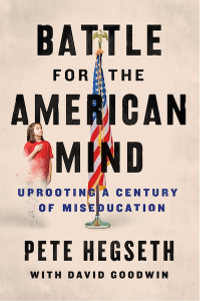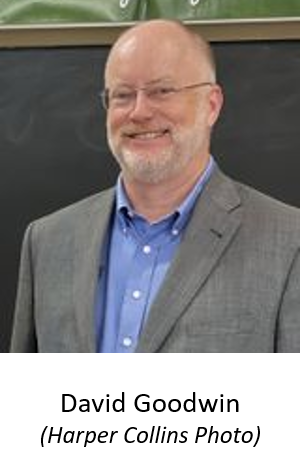Battle for the American Mind, Uprooting a Century of Miseducation
by Pete Hegseth with David Goodwin, Broadside Books, 2022
If prospective readers think author and television news pundit Pete Hegseth's new book is just a fluff piece, or worse yet, a regurgitation of other exceptional works about our modern American educational nightmare, such as Alex Newman and Sam Blumenfeld's Crimes of the Educators, they would be mistaken.
 Battle for the American Mind offers a different take on how American education evolved from a biblically based, Western civilization-oriented, parent-directed endeavor to the state-mandated, disordered, secretive mess we see in today's public schools. As co-author and researcher Goodwin notes on the very first page: "[T]his book is not just about education. It is about freedom, our culture, and our families — and the quiet peril inflicted upon all three."
Battle for the American Mind offers a different take on how American education evolved from a biblically based, Western civilization-oriented, parent-directed endeavor to the state-mandated, disordered, secretive mess we see in today's public schools. As co-author and researcher Goodwin notes on the very first page: "[T]his book is not just about education. It is about freedom, our culture, and our families — and the quiet peril inflicted upon all three."
Hegseth begins with acknowledgement of how the COVID-19 pandemic opened the school room doors, exposing the propaganda and misinformation being fed to children in public education across the country, including the 1619 Project and CRT, the redefinition of gender, and climate fatalism. Parents saw in full view that their children were being turned into activists. "It was the 'woke' versus the newly awake," Hegseth writes. "You might call it the COVID (16)19 effect."
But the radical new concepts left many newly awakened parents and observers wringing their hands. As the author admits of himself, they did not understand where all this was coming from. He concedes that his previous books "were unabashedly conservative and pro-American, but the result was impotency," but believes that Battle for the American Mind gets to the heart of the matter. "Opening this book," he writes, "you probably thought, as I did, that the problem in our schools is what is being taught. It's not. The problem is what has been systematically, if quietly removed. (Emphasis in original.) Unless you understand the hidden backstory of this heist, you will almost certainly underestimate what once happened in American schools. The Progressives are counting on the fact that we never remember."
He recounts the familiar tale of the overarching results of leftist ideology and cultural Marxism on every aspect of curriculum, along with the common concession that "the unions control everything." He describes the federalization of curriculum in 2010 with Common Core, the influence of Howard Zinn, and the diminution of classical education replaced by training children for the workforce. (Phyllis Schlafly often warned about such training, citing in particular the "School to Work" program advanced by the Bush Administration in the early 2000s.)
After assessing the current situation, Hegseth offers his thesis for how we've arrived at this dark hour in American education. He begins by asking the question: "How did the Left get in such a dominant position?" The answer: "With American conservatives mostly preoccupied with defending economic freedom and military might, American Progressives knew that social control was far more powerful than economic control. As such, they set out to gain direct national control of the 'commanding heights' of America's schools. A project set in motion more than one hundred years ago is today leveraged through 16,000 hours of government instruction."
He then introduces the little-known Greek word "paideia" (pronounced pai-day-uh), which has no direct English translation but from which the word "pedagogy" stems. Pedagogy was the work a paidagogos did in ancient Greece—meaning "a leader who walks with students and trains them in manners, academics and virtue." As Goodwin points out in the book's Forward, "if you had to define paideia in a single word, it would be 'enculturation,' not teaching. Pedagogy is the act of formulating a culture in children. There's a clue here. What culture is the Left trying to form?"
 Simply defined, paideia "represents the deeply seated affections, thinking, viewpoints, and virtues embedded in children at a young age, or, more simply, the rearing, molding, and education of a child," Hegseth writes. (Emphasis in original.) "Classical Christian education creates a paideia unique in all of human history—one that enabled freedom." Losing that cultural force over time, he contends, created a vacuum that was filled by constructing a new paideia steeped in a new form of religion that replaced the Western Christian Paideia (WCP).
Simply defined, paideia "represents the deeply seated affections, thinking, viewpoints, and virtues embedded in children at a young age, or, more simply, the rearing, molding, and education of a child," Hegseth writes. (Emphasis in original.) "Classical Christian education creates a paideia unique in all of human history—one that enabled freedom." Losing that cultural force over time, he contends, created a vacuum that was filled by constructing a new paideia steeped in a new form of religion that replaced the Western Christian Paideia (WCP).
Hegseth may be onto something. While most conservative Christians love their country and are proudly patriotic, is it possible we were deliberately led down the patriotic path to draw us away from focusing on the eternal God and his kingdom, which in turn bred a greater focus on the worldly, even if for the ideals of freedom and personal responsibility?
This reviewer concedes that it could be so. Hegseth cites the work of author Lawrence Cremin, who wrote a Pulitzer Prize-winning "magnum opus on American Education." Cremin made a compelling case that "from its earliest beginnings, the Progressives were establishing a new paideia to replace the old Western Christian Paideia. He points out that they sought to replace Christ with 'democracy' or 'America' as the object of education. Specifically, they promoted a view of the good life in progressive America, with religion separate, compartmentalized, personal, and eventually nonexistent."
Not to decry aspects of our love of country, Hegseth writes that these affections were "co-opted" by Progressives through their American Paideia: "American exceptionalism, the pledge of allegiance, a strong affinity for the flag, and patriotism were the carriers they used early on to supplant the WCP. That does not make these things 'evil' today — I revere them all — but an honest reckoning with their origins helps us understand the progressive plot."
He shows how, with the WCP destroyed, the new American Progressive Paidaia (APP) could be twisted and morphed into any culture the Progressives wanted because it was a human invention. In contrast, the WCP was based on inerrant Scripture and 2,000-years of biblical moral ideals that were unchangeable.
The culture that gradually replaced the APP was "the Cultural Marxist Paideia (CMP)," which rose to maturity just after the turn of the twenty-first century. "With the WCP gone," Hegseth writes, "the Progressives spent the rest of the twentieth century, post-1965, formulating a new paideia based in 'critical theory' that villainized Christianity and the West."
Most interesting to this reviewer is Battle for the American Mind's in-depth history of the WCP. Surprisingly, the seeds for America's subversion were planted during its founding. "The WCP is a singularity in history," the authors show. "It was the innovation of a classical world dedicated to freedom and freedom-loving people. It was created specifically to sustain republics more than two thousand years ago. Our founding fathers leaned heavily on the WCP in their debates as they formed the American Republic."
 But the book contends that Benjamin Franklin and Thomas Jefferson did not have Christian intentions. "They both saw America as a new order—a sort of redemptive force in itself that would become a new promised land. Their imagery conflated the kingdom-purpose of Christianity with America. In the end, the creators of America's seal prevailed with the Latin phrases Annuit Coeptis (He has favored our undertaking) and Novus Ordo Seclorum (A new order of the ages has begun). The seal's design had moved to a Roman-inspired eagle, with the Deistic symbol of the all-seeing eye on the reverse. We no longer needed a Christian kingdom, or a symbol of the cross, but a new order under a generic God, vested in a nation based on new ideas. America's destiny as a City on a Hill, inspired by John Winthrop's speech of many decades earlier — 'A Model of Christian Charity' — was reimagined with America as the light of the nations, not Christ."
But the book contends that Benjamin Franklin and Thomas Jefferson did not have Christian intentions. "They both saw America as a new order—a sort of redemptive force in itself that would become a new promised land. Their imagery conflated the kingdom-purpose of Christianity with America. In the end, the creators of America's seal prevailed with the Latin phrases Annuit Coeptis (He has favored our undertaking) and Novus Ordo Seclorum (A new order of the ages has begun). The seal's design had moved to a Roman-inspired eagle, with the Deistic symbol of the all-seeing eye on the reverse. We no longer needed a Christian kingdom, or a symbol of the cross, but a new order under a generic God, vested in a nation based on new ideas. America's destiny as a City on a Hill, inspired by John Winthrop's speech of many decades earlier — 'A Model of Christian Charity' — was reimagined with America as the light of the nations, not Christ."
Because there were many Christians among America's Founding Fathers, including Patrick Henry, John Jay, Samuel Adams, and others, Hegseth observes that "this mixture of Deists and Christians established America on a firm foundation through our Declaration of Independence and Constitution. Both groups realized the danger of tyranny, especially on religious liberty, and thus sought to limit the powers of government." He clarifies, however, that "the diminished role of Christ's Kingdom in America's founding would unintentionally create structural vulnerabilities that Progressives eventually exploited."
So, what can be done at this late date? Hegseth's answer is a return to classical Christian education, which the book describes in detail, noting: "Classical Christian schools reject the social studies schema and the progressive educational institutions that govern education, both public and private... Christianity is essential to the classical school model." To make this happen, Hegseth believes: "Our only chance is to become educational insurgents in our own country." He provides an anecdote about his personal experience with studying insurgency in Afghanistan. "The Taliban controls Afghanistan today," he points out, "and America is gone from that battlefield. Insurgencies can work if they are executed properly."
Battle for the American Mind chronicles the inroads classical schools have already made during their 40-year history in the U.S., and provides a variety of specific examples of their success. (Education Reporter has showcased this movement in past issues and included individual examples.)
Hegseth concedes that, obviously, "our struggle is not military, but instead politico-cultural. We are not looking to topple our government, but instead to defeat the monopoly of government-run schools — and the leftist unions who are their occupying power. In the meantime, we increase our control by building an alternative education model." He follows with a description of the three phases he believes are essential to success. Finally, he offers an exhortation to parents and grandparents "to choose a different path for their children without shaming them for how, and where, their kids have been educated thus far.
"If we don't keep Christ the King as the center of our earthly efforts, our insurgency will never leave Phase One," he states. "America will need a spiritual revival to undergird an effort of such magnitude; so, after you read this book, join us in prayer as we run this race together."
This reviewer encourages Christians to do exactly that.
To read the entire book, go here to order!
The Education Reporter Book Review is a project of America’s Future, Inc. To find out more about America’s Future, visit AmericasFuture.net.
Want to be notified of new
Education Reporter content?
Your information will NOT be sold or shared and will ONLY be used to notify you of new content.
Click Here
Return to Home Page
